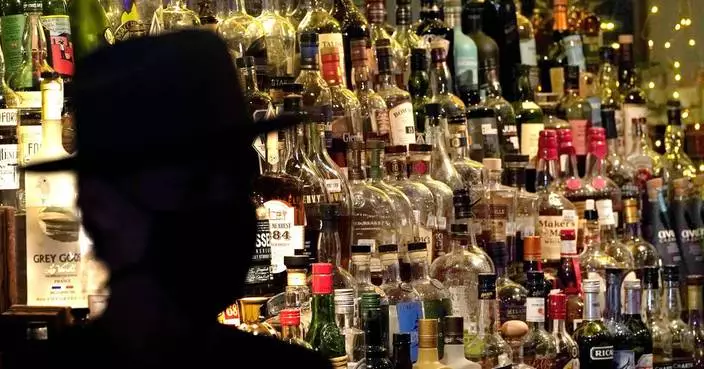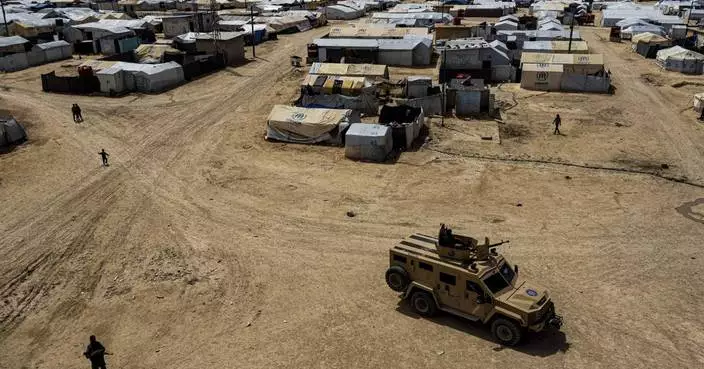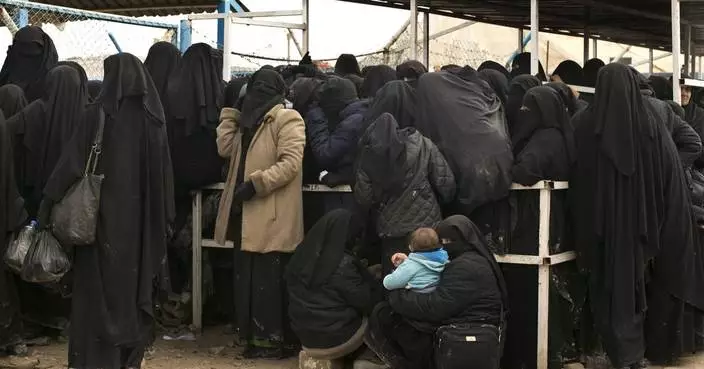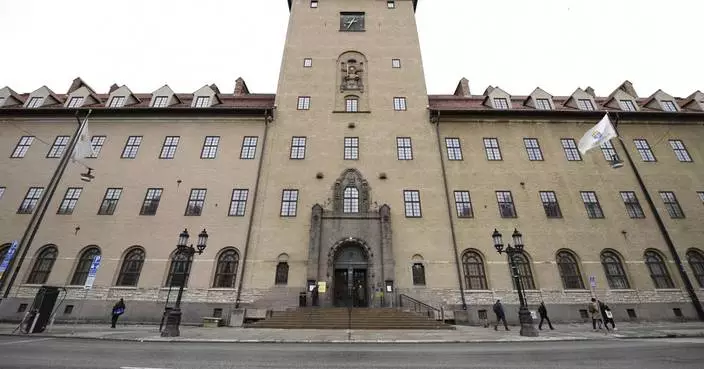Two days after Syrian troops declared Douma liberated from rebel fighters and 10 days since a suspected chemical attack, a tour of the town just east of Damascus on Monday revealed widespread destruction and traumatized residents who recalled months spent cowering in crowded underground shelters infested with lice, with barely any food or water.
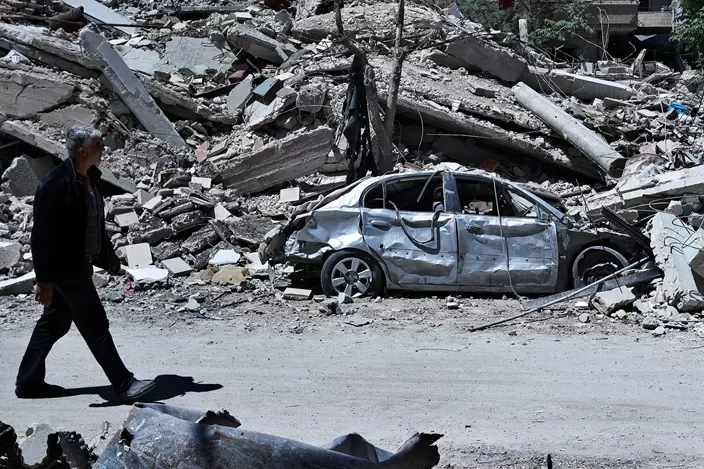
A Syrian man walks by damaged buildings in the town of Douma, the site of a suspected chemical weapons attack, near Damascus, Syria, Monday, April 16, 2018. (AP Photo/Hassan Ammar)
Except for the Russian and Syrian troops patrolling the streets, few people could be seen in Douma, the majority of its residents now displaced to rebel-held areas to the north.
Click to Gallery
Two days after Syrian troops declared Douma liberated from rebel fighters and 10 days since a suspected chemical attack, a tour of the town just east of Damascus on Monday revealed widespread destruction and traumatized residents who recalled months spent cowering in crowded underground shelters infested with lice, with barely any food or water.
Except for the Russian and Syrian troops patrolling the streets, few people could be seen in Douma, the majority of its residents now displaced to rebel-held areas to the north.
Douma was one of the first areas to rise up against President Bashar Assad's government and until a few weeks ago it was a major threat to his seat of power in Damascus, as rebels pelted it with shells, disrupting normal life. On Saturday, Syrian government forces entered Douma for the first time since 2012, marking the biggest victory for Assad's forces since the conflict began in 2011.
On an Associated Press tour of the town, organized by the Assad government, hundreds of men, women and children could be seen standing in long lines waiting their turn to get pasta, vegetables and loaves of bread piled on government trucks and handed out for free.
"Our happiness is double now. We are eating wheat bread and we sleep without fear," said tailor Alaa Khobiyeh. "Most importantly, we sleep above ground not underground."
Residents also spoke of several local families who used to buy large amounts of food and hoard it to sell later at a far higher price, making most food products out of reach for most people.
Douma was the scene of a suspected chemical weapons attack on April 7 that killed more than 40 people and hastened the rebels' surrender to government forces. During a government-organized trip Monday, survivors spoke to the AP of the horror they witnessed from a chlorine-like substance that killed their neighbors, but they blamed the rebels for the attack, without providing any evidence.
Hamdan said that initial funding of 5 billion Syrian pounds ($10.8 million) had been set aside "for different domains, and if it is not enough then we are ready to fund more."
The main hospital, courthouse and municipal buildings were largely reduced to rubble, while the nearby Grand Mosque, famed for its towering arches, white dome and majestic palm trees was riddled with bullet and shell holes — testimony to the intense government assault the town was subjected to since being seized by the rebels six years ago.
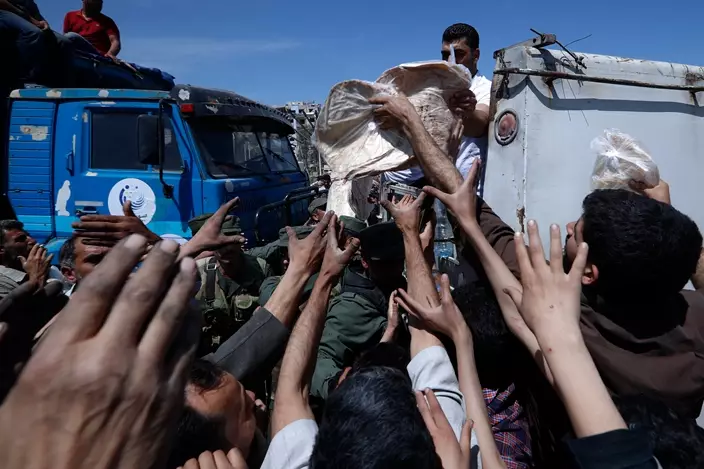
Syrian authorities distribute bread, vegetables and pasta to Douma residents, in the town of Douma, the site of a suspected chemical weapons attack, near Damascus, Syria, Monday, April 16, 2018. (AP Photo/Hassan Ammar)
Douma was one of the first areas to rise up against President Bashar Assad's government and until a few weeks ago it was a major threat to his seat of power in Damascus, as rebels pelted it with shells, disrupting normal life. On Saturday, Syrian government forces entered Douma for the first time since 2012, marking the biggest victory for Assad's forces since the conflict began in 2011.
On Monday, the few remaining residents were able to move around safely for the first time in months following the crushing government offensive and a yearslong siege, tightened even further last year, that had starved the town, once the bread basket of the capital, of food, medical supplies and other essentials.

A Syrian man holds bread as Syrian authorities distributed bread, vegetables and pasta to Douma residents, in the town of Douma, the site of a suspected chemical weapons attack, near Damascus, Syria, Monday, April 16, 2018.(AP Photo/Hassan Ammar)
On an Associated Press tour of the town, organized by the Assad government, hundreds of men, women and children could be seen standing in long lines waiting their turn to get pasta, vegetables and loaves of bread piled on government trucks and handed out for free.
"This is the first time I will eat wheat bread in years," said Naim Saqour, an 18-year-old, after receiving a pack of nine Arab loaves from the government employees. Saqour said that he and his family had survived for months on olives and small amounts of barley bread.
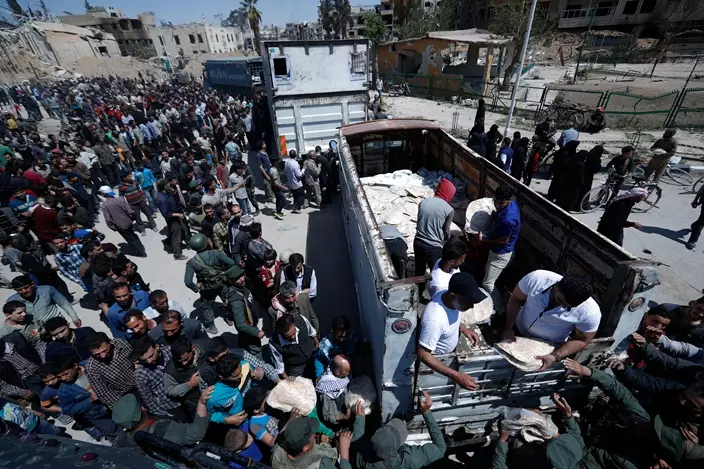
Syrian authorities distribute bread, vegetables and pasta to Douma residents in the town of Douma, the site of a suspected chemical weapons attack, near Damascus, Syria, Monday, April 16, 2018. (AP Photo/Hassan Ammar)
"Our happiness is double now. We are eating wheat bread and we sleep without fear," said tailor Alaa Khobiyeh. "Most importantly, we sleep above ground not underground."
Many residents blamed the greed of some local businessmen and the main rebel group in Douma, the Saudi-backed Army of Islam, for much of their misery, by raising food prices to make more money and hiding the scant food supplies from people in need. After the Army of Islam left town, they said, they discovered the militants had stored large amounts of rice, flour, wheat, canned goods and other food — enough, they said to feed residents for months.
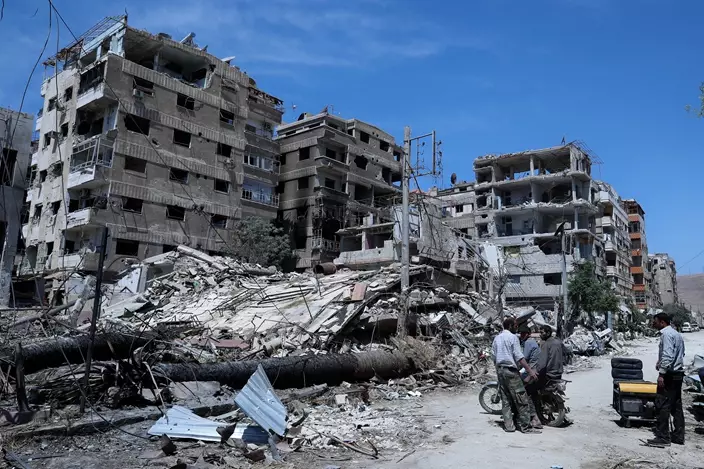
People stand in front of damaged buildings, in the town of Douma, the site of a suspected chemical weapons attack, near Damascus, Syria, Monday, April 16, 2018. (AP Photo/Hassan Ammar)
Residents also spoke of several local families who used to buy large amounts of food and hoard it to sell later at a far higher price, making most food products out of reach for most people.
Wafaa al-Seikh, 60, spoke wistfully of a time, years ago, when she used to cook a different dish for her family of six children and have a shower every day. For the past year, she said she could not afford to pay for staples like sugar, which shot up to 18,000 Syrian pounds ($40) a kilogram (2.2 pounds), from its normal price of 500 Syrian pounds (about $1.10).
"A month could pass without having a shower," said the woman, who had rice for the first time in years on Sunday. She described the past two months during the army's offensive to capture Douma as terrifying, with time passing slowly in shelters with little food and lice spreading among residents.
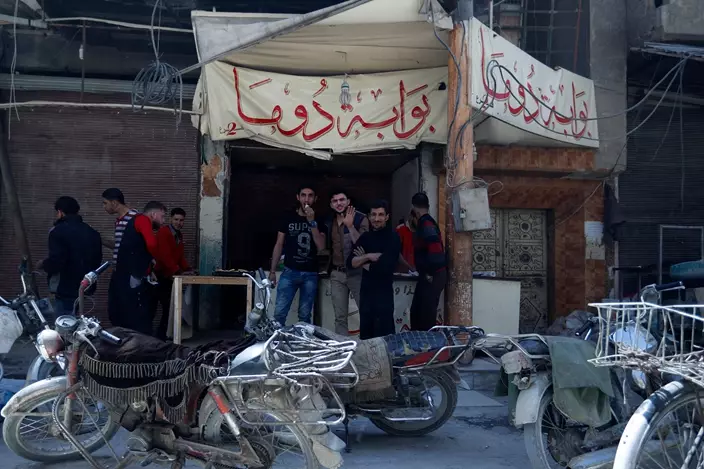
Syrians have their breakfast at a restaurant called Douma gate in the town of Douma, the site of a suspected chemical weapons attack, near Damascus, Syria, Monday, April 16, 2018. (AP Photo/Hassan Ammar)
Douma was the scene of a suspected chemical weapons attack on April 7 that killed more than 40 people and hastened the rebels' surrender to government forces. During a government-organized trip Monday, survivors spoke to the AP of the horror they witnessed from a chlorine-like substance that killed their neighbors, but they blamed the rebels for the attack, without providing any evidence.
The Assad government was working on winning the hearts and minds of Douma residents, handing out the free food Monday and pledging to restore services in a timely fashion.
At a meeting on Monday attended by Syrian Finance Minister Maamoun Hamdan, several local bankers and a number of Douma dignitaries, Hamdan promised that services would start improving in coming weeks and mobile bakeries would be deployed in neighborhoods to sell bread, the country's main staple, at cost.
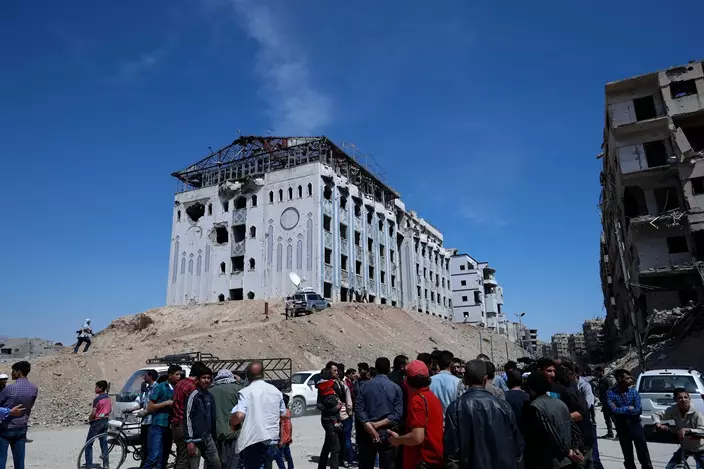
In this Monday, April 16, 2018 photo, people gather in front of a hospital that locals referred as Point One, left, just meters away from where the alleged chemical weapons attack occurred in the town of Douma, the site of a suspected chemical weapons attack, near Damascus, Syria. (AP Photo/Hassan Ammar)
Hamdan said that initial funding of 5 billion Syrian pounds ($10.8 million) had been set aside "for different domains, and if it is not enough then we are ready to fund more."
Maj. Gen. Issam Shehadeh Al-Hallaj, the chief police commander in the region, said that security forces were manning 15 checkpoints set up outside town to secure public properties and maintain order. He said 60,000 residents remained in the town after tens of thousands of rebels and their families left for rebel-held areas in northern Syria over the past two weeks. "We have deployed patrolling forces in all the squares to save the citizens and to spread security," he said.
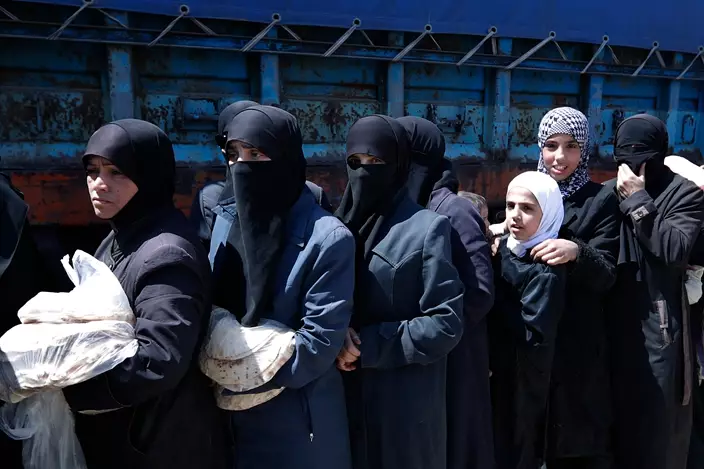
Syrian women wait for Syrian authorities distributing bread, vegetables and pasta to Douma residents, in the town of Douma, the site of a suspected chemical weapons attack, near Damascus, Syria, Monday, April 16, 2018. (AP Photo/Hassan Ammar)
MINNEAPOLIS (AP) — A Minnesota man who once fought for the Islamic State group in Syria but now expresses remorse for joining a “death cult” and has been cooperating with federal authorities will have to wait to learn how much prison time he faces after his sentencing hearing set for Wednesday was canceled.
Federal prosecutors have recommended 12 years for Abelhamid Al-Madioum in recognition both of the seriousness of his crime and the help has he given the U.S. and other governments. His attorney says that seven years is enough and that Al-Madioum, 27, stopped believing in the group's extremist ideology years ago.
A court notice posted online just over two hours before the hearing was to begin said it would be rescheduled for a date to be determined. The notice did not give a reason for the cancellation.
Al-Madioum was 18 in 2014 when IS recruited him. The college student slipped away from his family on a visit to their native Morocco in 2015. Making his way to Syria, he became a soldier for IS, also known as ISIS, until he was maimed in an explosion in Iraq. Unable to fight, he used his computer skills to serve the group. He surrendered to U.S.-backed rebels in 2019 and was imprisoned under harsh conditions.
Al-Madioum returned to the U.S. in 2020 and pleaded guilty in 2021 to providing material support to a designated terrorist organization. According to court filings, he has been cooperating with U.S. authorities and allied governments. The defense says he hopes to work in future counterterrorism and deradicalization efforts.
“The person who left was young, ignorant, and misguided," Al-Madioum said in a letter to U.S. District Judge Ann Montgomery, who will sentence him.
“I’ve been changed by life experience: by the treachery I endured as a member of ISIS, by becoming a father of four, a husband, an amputee, a prisoner of war, a malnourished supplicant, by seeing the pain and anguish and gnashing of teeth that terrorism causes, the humiliation, the tears, the shame,” he added. "I joined a death cult, and it was the biggest mistake of my life.”
Prosecutors acknowledge that Al-Madioum has provided useful assistance to U..S. authorities in several national security investigations and prosecutions, and that he accepted responsibility for his crime and pleaded guilty promptly on his return to the U.S. But they say they factored his cooperation into their recommended sentence of 12 years instead of the statutory maximum of 20 years.
“The defendant did much more than harbor extremist beliefs,” prosecutors wrote in a sentencing memo. “He chose violent action by taking up arms for ISIS.”
Al-Madioum, a naturalized U.S. citizen, was among several Minnesotans suspected of leaving the U.S. to join the Islamic State group, along with thousands of fighters from other countries worldwide. Roughly three dozen people are known to have left Minnesota to join militant groups in Somalia or Syria. In 2016, nine Minnesota men were sentenced on federal charges of conspiring to join IS.
But Al-Madioum is one of the relatively few Americans who have been brought back to the U.S. who actually fought for the group. According to a defense sentencing memo, he's one of 11 adults as of 2023 to be formally repatriated to the U.S. from the conflict in Syria and Iraq to face charges for terrorist-related crimes and alleged affiliations with IS. Others received sentences ranging from four years to life plus 70 years.
Al-Madioum grew up in the Minneapolis suburb of St. Louis Park in a loving and nonreligious family, the defense memo said. He joined IS because he wanted to help Muslims he believed were being slaughtered by Syrian President Bashar Assad's regime in that country's civil war. IS recruiters persuaded him “to test his faith and become a real Muslim.”
But he was a fighter for less than two months before he lost his right arm below the elbow in the explosion that also left him with two badly broken legs and other severe injuries. He may still require amputation of one leg, the defense says.
While recuperating in 2016, he met his first wife, Fatima, an IS widow who already had a son and bore him another in 2017. They lived in poverty and under constant airstrikes. He was unable to work, and his stipend from IS stopped in 2018. They lived in a makeshift tent, the defense says.
He married his second wife, Fozia, in 2018. She also was an IS widow and already had a 4-year-old daughter. They had separated by early 2019. He heard later she and their daughter together had died. The first wife also is dead, having been shot in front of Al-Madioum by either rebel forces or an IS fighter in 2019, the defense says.
The day after that shooting, he walked with his sons and surrendered to the Kurdish-led Syrian Democratic Forces, which held him under conditions the defense described as “heinous” for 18 months until the FBI returned him to the U.S.
As for Al-Madioum’s children, the defense memo said that they were eventually found in a Syrian orphanage and that his parents will be their foster parents when they arrive in the U.S.

This image provided by the Sherburne County Jail in Elk River, Minn., shows Abelhamid Al-Madioum, a Minnesota man who once fought for the Islamic State group in Syria. Al-Madioum, who has been cooperating with federal authorities and now expresses remorse for joining a “death cult”, will learn Wednesday, May 1, 2024, how much prison time he faces. Al-Madioum was brought to the U.S. in 2020 and pleaded guilty in 2021 to providing material support to a designated terrorist organization. (Sherburne County Jail via AP)













